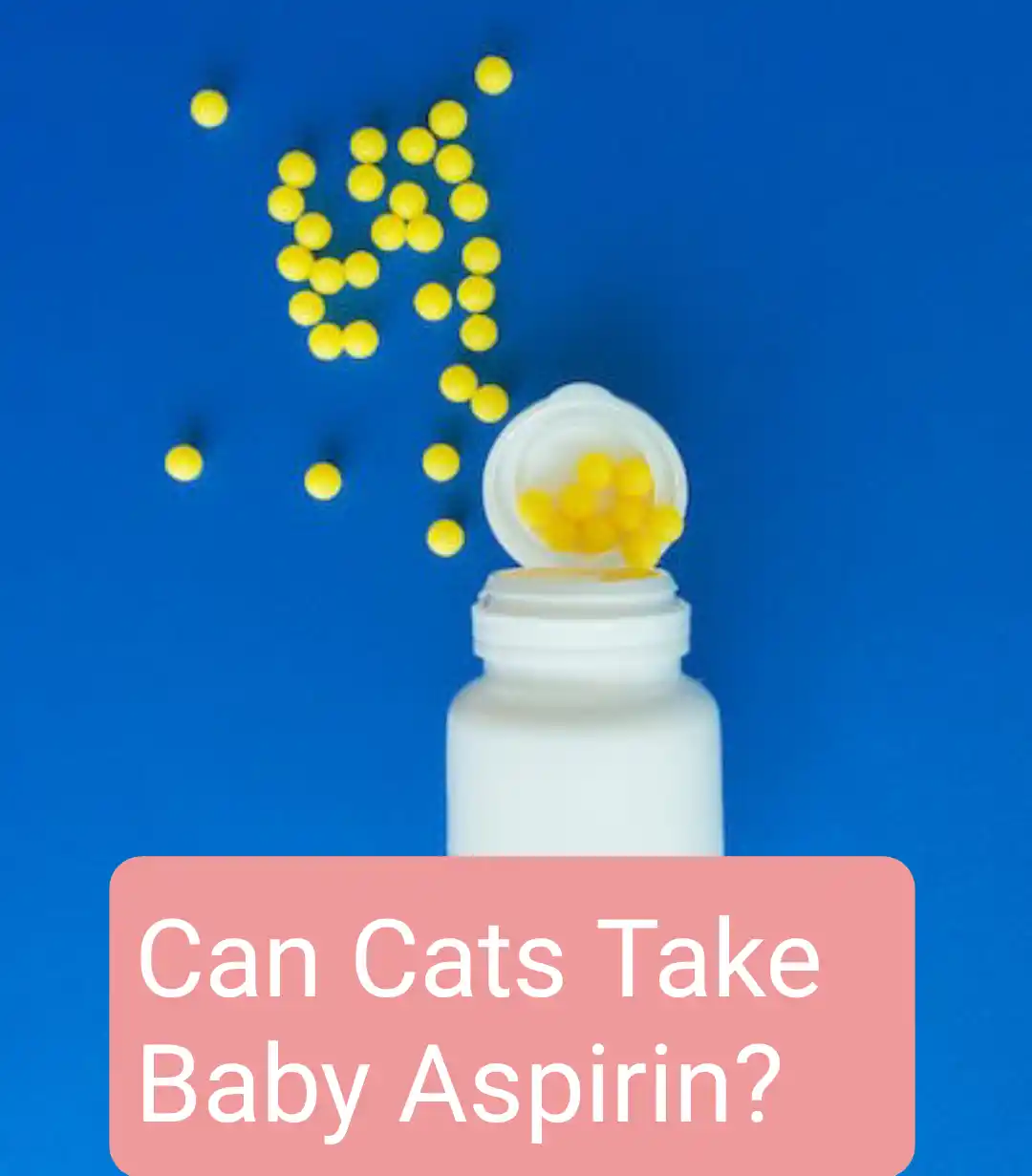Can Cats Take Baby Aspirin? What You Should Know and 5 Prescription Alternatives

Cats are prone to kidney failure and other preventable diseases if you don’t watch over what you give them; so, can cats take baby Aspirin? Can you give cats baby aspirin?
Aspirin is a Non-steroidal Anti-inflammatory drug (NSAID). It helps relieve inflammatory problems, arthritis included. The primary drug sold under the brand name Aspirin is acetylsalicylic acid, which decreases the number of specific enzymes the body produces. This drug is an over-the-counter drug in tablet form.
Aspirin may be prescribed for your cat by a veterinarian, and you need to adhere strictly to the dosage—since cats can easily overdose. The side effects can come with severe consequences. Here is what you should know about the dosage, uses, and side effects of Aspiring for cats.
Table of Contents
- Can cats take baby Aspirin?
- Dosage
- Uses of Baby Aspirin
- The side effect of baby Aspirin for cats
- Can You give Cats Baby Aspirin?
- Are Human Pain Meds Safe for Cats?
- What can you give a cat for pain?
- Opioids for cats
- Steroids For Inflammation in Cats
- Can cats Take Aspirin? – Conclusion
Can cats take baby Aspirin?
Yes, cats can take baby aspirin, but in the doses prescribed by the vet. Baby aspirin contains 81 mg of acetylsalicylic acid. A cat should take 10mg of aspirin per kg of body weight once in 48 hours.
A male Maine coon who weighs 8.2kg on average can take a tablet of baby aspirin once in 48 hours. But if you can entirely avoid giving your cat aspirin—it’s in the best interest of your cat. You should know that a little above the correct dosage can lead to almost instant depression, loss of appetite, and vomiting.
Dosage

As we explained in the subheadings above, you should adhere strictly to your vet’s directions. Overdose of aspirin can lead to liver or kidney damage.
A baby’s aspirin contains 81 mg of acetylsalicylic acid—your cat should only have 10mg per body weight and should be given to the cat once in 48 to 72 hours. To determine the exact dosage, you must know your kitty’s weight. It would help if you were sure your cat is going through pain; cats most times would conceal their illness; you might be mistaken; contact your vet before you give any medications.
Uses of Baby Aspirin
Aspirin for cats is often used mainly in treating inflammation-related issues such as arthritis. It can also be effective in resolving fever and blood clots.
Decreasing the amount of the COX-1 and COX-2 enzymes produced by the cat’s body is the actual work of aspirin-this will, in turn, reduce the amount of pain and inflammation a cat faces.
Aspirin works best when administered to the cat alongside its food—this medication is primarily available in tablet forms and will start working on your cat in one to two hours.
The side effect of baby Aspirin for cats
Baby Aspirin for cats can cause several side effects. Some of the most common side effects you’ll notice in your cat after taking aspirin includes:
- Depression
- Loss of appetite
- Vomiting
- Diarrhea
- Drooling
- Lethargy
- Ulcers
- Seizures
If, after taking aspirin, your cat experiences any of those symptoms above, watch them closely and inform your vet.
There are other drugs that aspirin may react with—this includes insulin, other NSAIDs, and antidepressants. Give your vet proper information, and let them know if your cat is on other medication—to avoid a possible drug reaction.
Can You give Cats Baby Aspirin?
You should give a cat aspirin only if your veterinarian tells you to.
Cats are susceptible animals, and one wrong move could cause serious harm. So it’s essential to be as informed as possible before you make any decisions about their care.
That being said, there are some cases where aspirin can be beneficial for cats. For example, it can help reduce inflammation and pain. But it’s crucial to follow your veterinarian’s instructions carefully and never give a cat more aspirin than they’re prescribed.
Are Human Pain Meds Safe for Cats?
No, it would be best if you never had your cat take a medication designed for humans unless you have your vet go ahead. If you have given your cat a human pain medication, inform your vet or call Animal Poison Control(1-888-426-4435).
Many pain-relieving drugs designed for humans can be extremely harmful to your pet, even in small amounts. Tylenol has just the right amount of acetaminophen to kill most cats. Your kitty’s red blood cells and liver can be damaged by acetaminophen; never use it to treat pains in cats.
Non-steroidal anti-inflammatory drugs(NSAIDs) like ibuprofen, naproxen, and aspirin can harm cats. They could cause kidney damage, abnormal clotting of the blood, and gastrointestinal ulcers.
Sometimes, your vet may ask you to give your cat some of these NSAIDs drugs, but they will specify the right amounts and duration—adhere strictly.
What can you give a cat for pain?
Depending on your cat’s condition, your cat may require some pain relief. Your vet will consider how severe the pain is and your kitty’s overall health—before deciding on a safe option. Below are some of the most prescribed pain relievers for cats:
Prescription NSAIDs for cats
Prescription NSAIDs effectively block the enzyme that leads to pain and inflammation. These prescription drugs are equally used with caution.
Unlike over-the-counter NSAIDs, prescription NSAIDs maintain blood flow to your kitty’s kidneys, protect its stomach from ulcers, and aid blood clots.
Onsior (Robenacoxib)
After surgery, onsior is usually prescribed for cats to realize pains and inflammation—it is usually a short-term medication of three days maximum. For more painful conditions like cancer, onsior can be used for longer durations.
Side effects include loss of appetite, diarrhea, vomiting, lethargy, liver and kidney damage, and issues with blood clothing that can be discovered—usually when you give your cat extended or excessive doses.
Metacam (meloxicam)
Meloxicam is only available by prescription. To treat postoperative pain in cats, a single dose of injectable meloxicam is approved by the FDA. An oral form of meloxicam is used off-label for severe conditions like cancer. But be aware kidney damage is likely to occur if Metacam is used for an extended period.
Opioids for cats
Opioids are a great alternative to NSAIDs for cats in pain by veterinarians. Sometimes, NSAIDs may not provide enough relief as needed for cats with moderate to severe pain, and in situations where NSAIDs are not a good option for a cat, Opioids are often prescribed.
There are two forms of Opioids, it could be natural( derived from the poppy plant) or synthetic( made in the lab). Either form of opioid binds to and also blocks receptors in the nervous system that play a role in pain sensation.
Opioids are substances that are very well controlled due to the potential for abuse and addiction in people.
Buprenorphine
This can be used for short-term pain relief, like after an injury or surgery, or even for more extended periods for other chronically painful conditions like cancer or osteoarthritis.
Buprenorphine can be absorbed through the mucous membranes in the mouth, or your vet could administer it through injections. Buprenorphine is less likely to result in anything fatal; provided it is used appropriately, it could lead to constricted pupils, lethargy, slow breathing, and increased body temperature.
Tramadol
Tramadol can only be gotten through prescription, and it’s an effective short-term pain relief medication—especially after surgery. But it could be used for long periods for severe conditions like cancer.
Tramadol is usually compounded into liquids using cat-friendly flavors—because it is very bitter. Effects that could be noted in long-term use include lethargy, dilated pupils, strange behaviors, constipation, and seizures.
Duragesic (fentanyl patch)
After having an injury or surgery, cats may need several days of pain from moderate or severe pain—prescription fentanyl is administered chiefly.
Fentanyl patches are applied to the cat’s shaved skin—removed when the medication wares off(usually within five days). When used approximately, fentanyl patches are very safe for your cat. The aide effects could include dilated pupils, slow breathing, lethargy, vomiting, and high temperature.
Your vet can prescribe other types of cat-safe opioids.
Steroids For Inflammation in Cats
Corticosteroids are very effective anti-inflammatory medication. The discomfort felt by a cat can be reduced when you reduce inflammation in the cat, certain steroids such as methylprednisolone, dexamethasone, and prednisolone are not always used for relieving pains in cats, especially for long periods as a result of their side effects, the development of diabetes in the cat, slow healing, and cartilage degeneration.
When Nonsteroidal-anti-inflammatories and corticosteroids are taken at the same time by your cat, there is an increase in the chances of your kitty’s kidney being damaged. Also, gastrointestinal ulcers could be developed
Can cats Take Aspirin? – Conclusion
foremost, consult your veterinarian before giving your cat any medication, prescription, or over-the-counter. They will be able to tell you if baby aspirin is safe for your cat and what dosage is appropriate.
Secondly, be mindful of the ingredients in a cat baby aspirin. Many brands contain caffeine, which is not safe for cats. ensure you only give your cat baby aspirin that does not contain caffeine.
Finally, keep an eye on your cat while taking baby aspirin. As with any medication, there is always a risk of side effects. If your cat experiences any adverse effects after taking baby aspirin, stop giving it to them and take them to the vet.





3 Comments